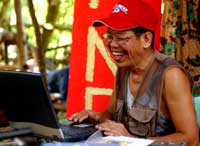
| Home | CPP | NPA | NDF | Ang Bayan | KR Online | Public Info | Publications | Kultura | Specials | Photos |

| |||||||||||||||||||||||
|
|
The daily life of the NPA consists of mingling with the masses, tirelessly conducting propaganda, imparting education, engaging in discussions and directly helping the masses in production and whatever work needs to be done in the homes of the masses. The comrades strive to participate in all of these chores-cooking, washing dishes, drawing water, chopping wood, cleaning, even solving family problems. The aim is to be able to help even with the smallest matters that are also important to the masses, up to resolving the biggest problems. The biggest, of course, is the problem of land-the principal means by which comrades extend assistance is by teaching and by leading them in understanding the issues and in struggling for genuine land reform. They also help in resolving other problems of the masses, such as their exploitation by merchant-usurers; the problem of oppression by the government, the military, the warlords; problems of criminality, among others. Help usually comes principally in the form of teaching the masses to organize themselves and to mobilize for their own welfare and the welfare of others. Thus, the Red fighter is an agitator, organizer and also a campaigner. Sometimes, he is also a priest because the masses aproach him whenever there are problems. Sometimes, he is a lawyer-a defender of peasants against the deception and oppression perpetrated by landlords, businesspeople and bureaucrats. He is also often a counselor or arbiter, mediating contradictions
The fighters are thrust into all sorts of jobs. This is because revolutionaries are obliged to address whatever problem the peasant masses bring to their attention. If a comrade does not yet have sufficient knowledge about a particular matter, he or she must conduct an investigation and study the matter. He or she must consult other comrades or whoever has knowledge about it, so he or she could be of assistance and always be able to find solutions to any relevant issue that the masses bring to their attention. Because we are revolutionaries, we have responsibly taken on all of this. The NPA also relies on the masses to advance the armed struggle, so even in carrying out military work-from conducting research and intelligence work, preparing food rations, medicine and other supplies, and in some instance, even in actually implementing military actions-the people's army really needs the help of the masses. Therefore, every Red fighter can be said to be fully immersed among the masses and this is what they devote their whole life to. The struggle for oneself and one's family becomes secondary. He or she immerses and addresses these matters in the context of his or her daily tasks and struggle for the people.TOP 2. As the father of a family, in what way do you consider the family
|
 |
In the people's army, the usual source of enjoyment is telling jokes. We also frequent sing beautiful revolutionary songs and continuously share important experiences and lessons. And we are obliged to amuse ourselves occasionally to avoid boredom or so we don't age too fast or have such grim dispositions. We can easily do things that can be sources of amusement and enjoyment for all. Hence, in the daily life of the people's army, you can see a lot of gaiety and satisfaction, a lot of funny and pleasing things, many episodes that bring out smiles and warm the heart. Especially after having overcome the previous disorientation, you can hardly see anyone who is beset by depression or is unenthusiastic in relating with others.
They also say that it is in a revolutionary's nature to find joy in small things. "Mababaw ang kaligayan." Because his outlook is strategic, he thoroughly values tactical victories and even the fleeting moments of happiness and comfort. Because a revolutionary controls his thinking, he can find amusement even in the face of difficult tasks, arduous conditions, huge problems and even in confronting the enemy and confronting failure.
As for me, I love listening to music. Even when I was not yet a revolutionary, I had already learned a saying about this, but I don't remember who wrote it. I was in Third Grade then. It said: "Music makes me happy in times of peace and makes me brave in times of war." I can't ever forget that. My only problem is that the music that I love to hear is not to the liking of many of our younger comrades. But it's ok.
Above all, what gives me the greatest pleasure is the fact that I could carry out revolutionary tasks and be of help in slowly raising the consciousness of the people, so we could accumulate victories. That is our greatest source of pleasure, being able to carry out our revolutionary tasks, carry out the duties we swore to undertake for the revolution and the people, and contribute to the overall advance of the revolution.TOP
| <<< PREVIOUS |
[ HOME | CPP | NPA |NDF | Ang Bayan | KR Online |Public Info] [Publications | Specials | Kultura | Photos] The Philippine Revolution Web Central is maintained by the Information Bureau of the Communist Party of the Philippines. Click here to send your feedback. |
|